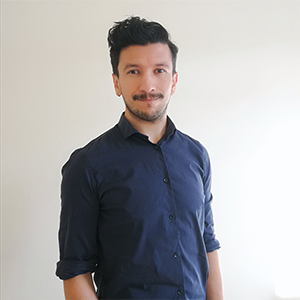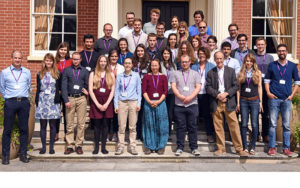
A conversation about cancer training and the impact on careers
The benefits of attending a dedicated course on the evolutionary and ecological aspects of cancer!
After a 2-year break, we are excited to welcome our scientific communities back to the Wellcome Genome Campus, for in-person and hybrid events at the Hinxton Hall Conference Centre, from June 2022.
One of these exciting events is the 3rd Evolutionary Biology and Ecology of Cancer course (#EBEC22); and we look forward to greeting students from all over the world, on campus from 13-17 June 2022. This course will train cancer biologists in evolutionary and ecological perspectives, as these two disciplines form the basis of cancer theory, and are crucial to understanding and clinically controlling cancer.
We caught up with Dr Simon Castillo, one of the participants of our 2018 EBEC course, to hear about his experience and the impact this training has had on his research and career, over the past few years.

What was your position when you attended this course, and what have you been doing in the cancer field since then?
In 2018, I was a 3rd year Ecology PhD student, at the Faculty of Biological Sciences, Pontifical Catholic University, Chile. My PhD thesis was about theoretical aspects of cancer from an ecological perspective. Thanks to attending the EBEC course, I’m more connected to researchers across the world, who participate in the same science that I specialise in; I wouldn’t have made so many connections without this course. Participating at EBEC in 2018 opened different doors, leading me to my current position as Postdoctoral Training Fellow in Prof. Yuan’s team at The Institute of Cancer Research, in London, UK.
What were the best aspects of the Evolutionary Biology and Ecology of Cancer course you remember?
The course structure has many attractive aspects. One of them is studying cancer, considering elemental principles of biology; such as ecology and evolution. Another aspect was the group of renowned scientists who led the course lectures, and shared their cutting-edge science from the field with us. Taking the course as a residential activity, at the Hinxton Hall Conference Centre, based at the inspiring Wellcome Genome Campus, helps you to stay focused, immerse yourself in the topic, and leverage the benefits from being with a group of outstanding scientists. Finally, one of the best memories I have was being coached by Prof. Joel Brown, on translating from ecology to the ecology of cancer.

Do you think this course helped you progress to the next stage of your career?
When I found the course online, I started searching about the instructors’ and speakers’ work. One of them, Prof. Yuan, caught my attention because her team’s vision combines ecology, evolution, cancer, and AI. During the course, I approached Prof. Yuan, asking for the possibility of a short research visit to her lab. I visited the lab in 2019, and in 2020 I joined the Yuan lab as a post-doc. The EBEC course facilitated many new connections, and enabled me to learn more about people who view cancer from a similar perspective to mine. Undoubtedly, it enabled me to keep in touch with researchers and find opportunities, such as the opening at the Yuan Lab.
It’s nice to hear that the course helped you form new collaborations. Is there anything else you would like to share about attending the course?
I recommend this course for people from different backgrounds. Clinicians, biologists, epidemiologists, and veterinarians who are interested in cancer research can get so much from this experience, which will help broaden your perspective on cancer.
If you are a researcher interested in understanding cancer from an evolutionary and ecological perspective, consider applying by 12 April 2022. Applications from early-career scientists, including PhD students, postdoctoral fellows and new principal investigators, are welcome. A limited number of bursaries are also available to attend this course.
This year’s programme will highlight various modelling (e.g. agent-based, game theory), ecological, phylogenetic and digital pathology tools used in cancer research. In addition, participants will gain knowledge of evolutionary biology as applied to the somatic cell evolution in cancer, as well as the principles of ecology relevant to studying tumour microenvironments and immune selection.
For detailed information and the final programme, please visit the course’s website.
